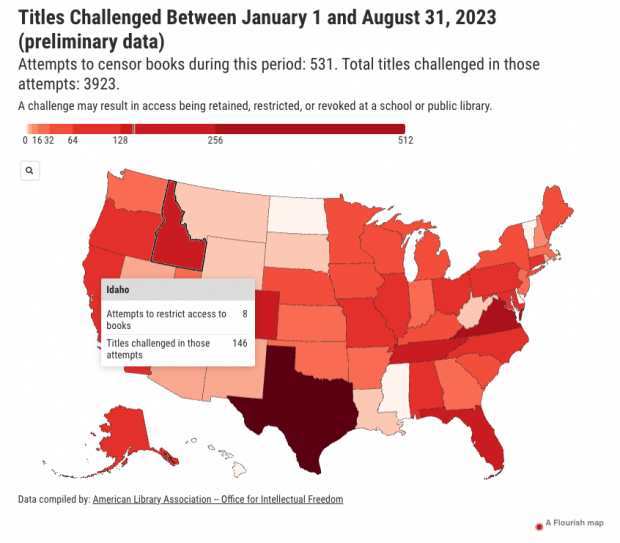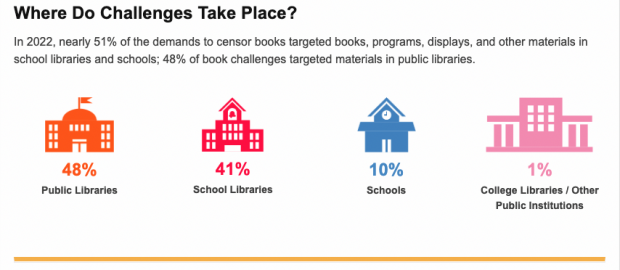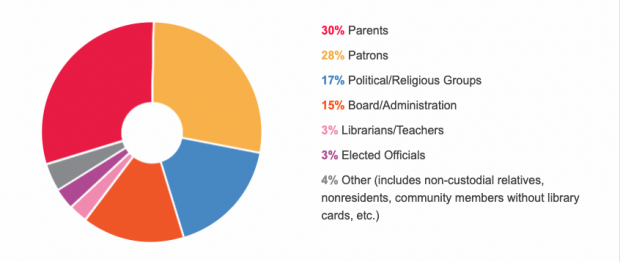For some librarians, celebrating Banned Books Week has lost its appeal.
State Librarian Stephanie Bailey-White chalks it up to “banned book fatigue” — the result of contending with an unprecedented number of book challenges, facing intense scrutiny for what they stock on their shelves, and sometimes, seeing titles pulled.
“That fatigue could lead to more self-censorship and not wanting to fight the fight every day,” Bailey-White said. “It can be exhausting for a library director and staff to face angry parents and deal with complaints on an ongoing basis.”
And there doesn’t seem to be an end in sight. Preliminary data shows a record surge of challenges in public libraries nationwide this year, according to the American Library Association. Since January, 146 titles in Idaho have been contested.
And that’s likely an undercount, said Lance McGrath, president of the Idaho Library Association.

So those banned book displays might be missing from the library lobby, and event calendars might not mention Banned Books Week, but censorship is still on librarians’ minds.
“It’s just so prominent right now that even if we wanted to avoid it, we can’t,” Bailey-White said.
Many librarians spent half of this week at the annual ILA conference, where conversation inevitably drifted to book censorship and sessions included topics like “Where’s the porn section? Recent efforts to censor materials in Idaho libraries” and “Tiered cards: A new approach to fighting against book bans.”
The focus on banned books — and efforts to protect them — takes away energy and time that could be spent on goals like bridging the digital divide, encouraging early literacy, and providing community for seniors and others who might otherwise be isolated, Bailey-White said.
Even so, librarians can’t afford to divert their attention for too long.

During the last legislative session, House Bill 314 — which would have allowed parents to seek $2,500 fines from libraries that distributed materials they deemed “harmful” to minors — nearly became law, and there’s sure to be another like it circulating this winter.
On top of that, the Idaho Counties Risk Management Program, which insures many public libraries, made significant reductions to its coverage that went into effect Oct. 1, as reported by the Coeur d’Alene Press.
“They won’t cover (lawsuits) around books, either keeping them on the shelf or removing them from libraries,” Bailey-White said. “Staff — and boards — are grappling with this issue even before it hits the session … and trying to figure out the ramifications.”
Some libraries have made policy changes, such as issuing special “restricted” library cards for children, to mitigate the need for a law like HB 314. And the ILA is encouraging librarians to have conversations with lawmakers ahead of the session so they aren’t blindsided by any proposed library bills — which ILA is fully expecting to see.

“The (ILA) is prepared to advocate for the freedom to access information and engage with ideas from the silly to the serious and the mundane to the mysterious and all things in between, on behalf of all Idahoans, from the very young to the very young at heart,” McGrath said. “Freedom of intellectual pursuits is a fundamental American ideal and a human right.”
From a historical perspective, book bans are not new, McGrath said. What has changed is the type of books challenged. Today, they tend to be books written by or about minorities — including people of color and those in the LGBTQ+ community.
As part of Banned Books Week Author Maggie Tokuda-Hall, will be reading from her book “Love in the Library” on Saturday at three locations: Twin Falls Public Library, 10-11 a.m.; Anne Frank Human Rights Memorial, 3-4 p.m.; Rediscovered Books, 7 p.m.
“It really is a barometer or a zeitgeist of the culture,” he said. “It shows a fear of that which is unfamiliar, that which is different. Rather than being curious and exercising one’s freedom to engage with information and learn more about the world, there’s that desire to not engage, or hear those stories, or interact with those voices, so we suppress.”
It comes down to a battle between the desire to protect and the desire to explore, McGrath said.
“And there are risks on either side, there are costs and benefits in that calculation we have to make. And those are both left up to parents, families, and the readers themselves.”
